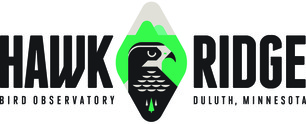
Dear Hawk Ridge Friends,
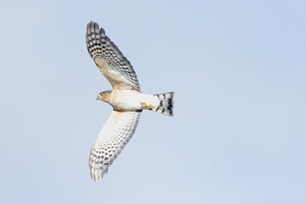 Happy
May! Spring is in full swing and we're enjoying the great diversity of
birds and sunshine! As of Tuesday, May 5th, over 16,000 raptors of 15
species have been counted. Close to 11,000 other birds (~80 different
species) have also been counted. You can read the April & March
monthly summaries below and continue to follow along online via our live
count HERE and raptor count HERE! If you've enjoyed keeping up with the count, here are several ways for you to pledge your support right now: 1) Raptorthon (see results below), 2) Give At Home MN (with giving incentives through 5/8 - more info below), 3) General Donation, 4) Membership (join or renew), and/or by purchasing a Hawk Ridge shirt or tote bag
online. All of these ways help us continue our research and education
efforts for bird conservation. Thank you and we send continued wishes
for good health and good birding!
Happy
May! Spring is in full swing and we're enjoying the great diversity of
birds and sunshine! As of Tuesday, May 5th, over 16,000 raptors of 15
species have been counted. Close to 11,000 other birds (~80 different
species) have also been counted. You can read the April & March
monthly summaries below and continue to follow along online via our live
count HERE and raptor count HERE! If you've enjoyed keeping up with the count, here are several ways for you to pledge your support right now: 1) Raptorthon (see results below), 2) Give At Home MN (with giving incentives through 5/8 - more info below), 3) General Donation, 4) Membership (join or renew), and/or by purchasing a Hawk Ridge shirt or tote bag
online. All of these ways help us continue our research and education
efforts for bird conservation. Thank you and we send continued wishes
for good health and good birding!
West Skyline Spring Count - April Summary Report
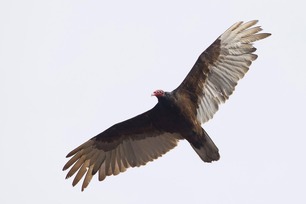 Just
shy of 10,000 raptors were counted here in Duluth this past April,
which is fantastic! April is always an exciting time, especially if you
like Red-tailed Hawks. Frank Nicoletti (Spring Count Director) said it’s
one of his favorite times of the Spring. The majority of April was once
again at the mercy of the majestic Lake Superior with pesky and
persistent NE and E winds, which are not as favorable for migration.
Nevertheless, winds can only thwart the birds for so long as they have
places to go!
Just
shy of 10,000 raptors were counted here in Duluth this past April,
which is fantastic! April is always an exciting time, especially if you
like Red-tailed Hawks. Frank Nicoletti (Spring Count Director) said it’s
one of his favorite times of the Spring. The majority of April was once
again at the mercy of the majestic Lake Superior with pesky and
persistent NE and E winds, which are not as favorable for migration.
Nevertheless, winds can only thwart the birds for so long as they have
places to go! 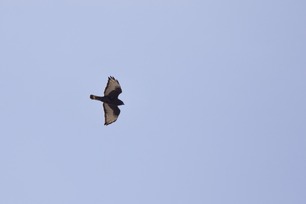 It
was almost a triple tie for 1st place in the ‘high count’ category. In
3rd place was an impressive surge of TURKEY VULTURES (2,156) with 336 on
the 11th. BROAD-WINGED HAWKS (2,591) came in 2nd, which is a good start
and included an amazing dark-morph on The bulk hopefully are still to
come and ultimately take the honors.
It
was almost a triple tie for 1st place in the ‘high count’ category. In
3rd place was an impressive surge of TURKEY VULTURES (2,156) with 336 on
the 11th. BROAD-WINGED HAWKS (2,591) came in 2nd, which is a good start
and included an amazing dark-morph on The bulk hopefully are still to
come and ultimately take the honors. 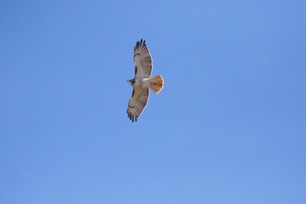 RED-TAILED
HAWKS (2,736) take the win though for April. However, their numbers are
arguably down this year, due to those aforementioned pesky winds, which
likely pushed them away from the lake as they headed north. Other
notable highlights were another 23 GOLDEN EAGLES, which brings the
season total so far to a very respectable 164.
RED-TAILED
HAWKS (2,736) take the win though for April. However, their numbers are
arguably down this year, due to those aforementioned pesky winds, which
likely pushed them away from the lake as they headed north. Other
notable highlights were another 23 GOLDEN EAGLES, which brings the
season total so far to a very respectable 164.
2
RED-SHOULDERED HAWKS and 3 SWAINSON’S HAWKS are always a highlight in
the spring, as the former generally is an overshoot, and the later a
wayward western stray. As we head into May, warmer temps, greenery and
insects should be enough to encourage many more migrants to head north.
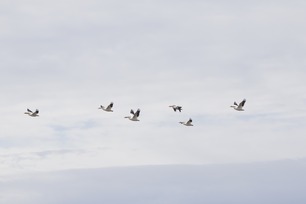 Already,
we have seen impressive numbers of waterfowl with a one-day total of
over 20,000 (mostly) GREATER SCAUP! Good numbers of AMERICAN WHITE
PELICANS (867), COMMON LOONS (270) and RED-BREASTED MERGANSERS (578)
have also been a joy to watch.
Already,
we have seen impressive numbers of waterfowl with a one-day total of
over 20,000 (mostly) GREATER SCAUP! Good numbers of AMERICAN WHITE
PELICANS (867), COMMON LOONS (270) and RED-BREASTED MERGANSERS (578)
have also been a joy to watch.
We encourage you to follow along with us with our live count
online HERE and our raptor count HERE. Stay safe and we look forward to days ahead when we can
watch the birds all together again! Thank you for your support!
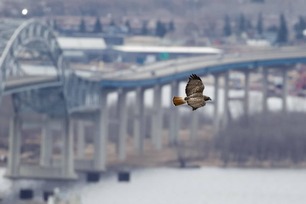 On Sunday, April 26th, Team Frank & Hawk Ridge Spring Counters conducted the 2020 Raptorthon to support both Hawk Ridge Bird Observatory and the Hawk Migration Association of North America’s (HMANA) efforts in raptor conservation, monitoring and research programs.
On Sunday, April 26th, Team Frank & Hawk Ridge Spring Counters conducted the 2020 Raptorthon to support both Hawk Ridge Bird Observatory and the Hawk Migration Association of North America’s (HMANA) efforts in raptor conservation, monitoring and research programs. %20and%20Frank%20Nicoletti%20(right)%20by%20J%20Long%202.jpg)
965 raptors of 13 species were counted, including a dark morph Swainson's Hawk! You can view the species totals HERE. A big thanks to Frank & John (pictured right) and to all our wonderful Hawk Ridge friends that have contributed. There's still time to donate and show your support by clicking HERE! Results of the Raptorthon are also published each year in the Hawk Migration Studies Journal via HMANA. THANK YOU!
 GiveMN.org
has launched a special fundraising event #GiveAtHomeMN to help support
nonprofits during the COVID-19 crisis. This time of giving means a lot
to Hawk Ridge and other nonprofits, with the advent of canceled school
field trips and other planned spring events. The opportunity to give
with special bonus incentives is taking place now through Thursday May
8th. Similar to Give to the Max, there are Golden Ticket drawings. $250
hourly and $2500 daily Golden Tickets will be randomly chosen from a
donation that hour or day. That means for a minimum of $5, you could
help Hawk Ridge Bird Observatory win a bonus grant of $2500! Please click HERE to donate today! Thank you so much for your consideration!
GiveMN.org
has launched a special fundraising event #GiveAtHomeMN to help support
nonprofits during the COVID-19 crisis. This time of giving means a lot
to Hawk Ridge and other nonprofits, with the advent of canceled school
field trips and other planned spring events. The opportunity to give
with special bonus incentives is taking place now through Thursday May
8th. Similar to Give to the Max, there are Golden Ticket drawings. $250
hourly and $2500 daily Golden Tickets will be randomly chosen from a
donation that hour or day. That means for a minimum of $5, you could
help Hawk Ridge Bird Observatory win a bonus grant of $2500! Please click HERE to donate today! Thank you so much for your consideration!
P.S.
While GiveMN is donating a portion of the processing fees this May, you
can always choose to donate fee-free by mailing a check to: Hawk Ridge
Bird Observatory, P.O. Box 3006, Duluth, MN 55803. Thank you!
FALL 2020 Hawk Ridge Seasonal Positions
* If you missed
our previous newsletter, we encourage you to continue reading below for
more information about our research, events, and other educational
resources.
West Skyline Spring Count - March Summary Report
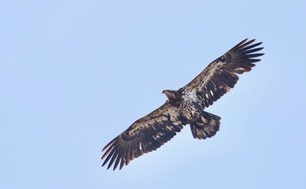 2020 marks our third consecutive year conducting the West
Skyline Spring Count full-time March-May. As we are all doing our best to adjust
during these trying times, March has quickly come and gone. We are now one month
into the Spring Count. There were 3,116 raptors counted in March (plus 18 more
counted on February 29, as it’s a leap year). That total is below March 2019 at
5,487 raptors, but above March 2018 at 2,148. We had 5 days with no raptors in
March, due to poor migration conditions and/or inclement weather.
2020 marks our third consecutive year conducting the West
Skyline Spring Count full-time March-May. As we are all doing our best to adjust
during these trying times, March has quickly come and gone. We are now one month
into the Spring Count. There were 3,116 raptors counted in March (plus 18 more
counted on February 29, as it’s a leap year). That total is below March 2019 at
5,487 raptors, but above March 2018 at 2,148. We had 5 days with no raptors in
March, due to poor migration conditions and/or inclement weather. 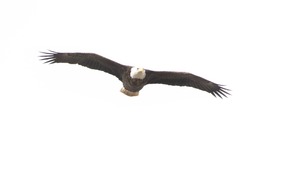 The majority of the raptors we see in March are eagles –
both Bald and Golden. Over 2,500 Bald Eagles have passed by on their way to
defend their territories and get ready for the season ahead. We had some wonderful
days of Golden Eagle flights, including a total of 33 counted on March 11th
and one day with 4 observed together right over the counters. A total of 140 were
counted in March. The Duluth News Tribune also published a nice article highlighting the eagle
migration, which can be viewed HERE.
The majority of the raptors we see in March are eagles –
both Bald and Golden. Over 2,500 Bald Eagles have passed by on their way to
defend their territories and get ready for the season ahead. We had some wonderful
days of Golden Eagle flights, including a total of 33 counted on March 11th
and one day with 4 observed together right over the counters. A total of 140 were
counted in March. The Duluth News Tribune also published a nice article highlighting the eagle
migration, which can be viewed HERE.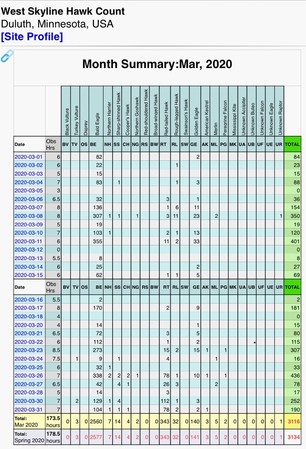 Red-tailed Hawks began
to kick in late March with respectable numbers (343), including a total of 112
counted on March 30th. April is their peak time, as well as the
majority of our raptors.
Red-tailed Hawks began
to kick in late March with respectable numbers (343), including a total of 112
counted on March 30th. April is their peak time, as well as the
majority of our raptors.
Rough-legged Hawks were counted about half the days in March
with a peak of 11 on March 8th and total of 32 for the month.
As we entered the last week of March, numbers slowly began
to pick up for other raptor species: Sharp-shinned Hawk (14), Northern Harrier
(7), Merlin (5), Cooper’s Hawk (4), Turkey Vulture (3), American Kestrel (3),
Northern Goshawk (2), Peregrine Falcon (2).
As the temperatures warm, we will continue to see more
migrants in April. We encourage you to follow along with us with our live count
online HERE and our raptor count HERE.
Stay safe and we look forward to days ahead when we can
watch the birds all together again! Thank you for your support!
Stay Safe - Let the Birds do the Migrating & Flocking
We love our visitors, but as everyone is aware, these are exceptional times for the safety of everyone. With
the advent of COVID-19 and Governor Walz’s Stay at Home Order effective
at least through May 18, we are also encouraging visitors to stay safe
and keep others safe by following
physical and social distancing guidelines outdoors. The National
Recreation and Park Association put together a statement HERE for safe use of parks and open spaces following guidelines set by The Centers for Disease Control and Prevention (CDC). It's important for the safety of everyone that
we adhere to these guidelines to avoid congregating at the West Skyline Spring Count site(s) during this critical time.

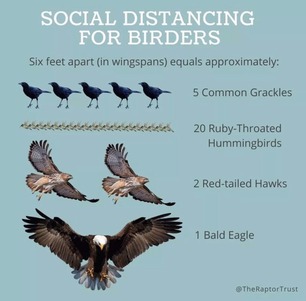
The
great thing about birdwatching is that birds are everywhere! People are
welcome to get outside locally and it's a wonderful time of year to
enjoy birding. Spring migration can be viewed from your own
backyard and neighborhood just by watching the sky and looking/listening
for birds in trees, brush, near water and feeders. Here's a fun and
educational image to help think about social distancing, while learning
about bird wingspans too!
Keep on reading below for more ideas to connect with nature during this time and beyond!
Stuck at Home? Stick to Nature!
By Margie Menzies, Hawk Ridge Education Program Director
Good news! Nature will continue to move
forward this spring and we may actually
have more time to watch it unfold and enjoy it! Birds will
gradually return to their breeding grounds, days are now longer than the
nights, and Spring will continue to develop day by day.
While
you are stationed at home or taking a break outside, here are some free
resources you can try to hopefully add to your enjoyment of nature, as
well as provide some peace and inspiration.
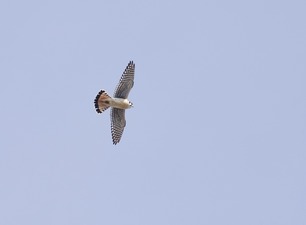 2. Check out what's happening with the spring bird migration here in Duluth, MN through our live count page HERE. You
can also view what's happening at other spring hawkwatch sites
throughout North America at through the Hawk Migration Association of
North America at: http://www.hawkcount.org/
2. Check out what's happening with the spring bird migration here in Duluth, MN through our live count page HERE. You
can also view what's happening at other spring hawkwatch sites
throughout North America at through the Hawk Migration Association of
North America at: http://www.hawkcount.org/
5. For the kids - check out the Audubon for Kids page HERE for DIY bird feeders & guides, bird art lessons, and more!
Please feel free to reach out with any education questions at mmenzies@hawkridge.org or (218) 428-8722.
Hawk Ridge
Bird Observatory announces a new research finding:
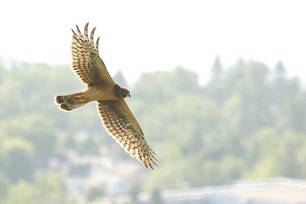 A team of
scientists from four hawk-watch sites led by Hawk Ridge Bird Observatory found that
the number of Northern Harriers migrating in the fall has fluctuated over a
4-year cycle across interior northeastern North America for at least 35
years. This conclusion means that
estimating long-term trends in harrier numbers from migration tallies can be
improved by taking the cycle into account, which hasn’t previously been done. The research also suggests that the harriers’
important summer prey, meadow voles, may cycle in concert in many places across
a large area, which has not been documented and merits further investigation. Cyclic
change in vole numbers was previously linked to a 4-year cycle in harrier
breeding only at a local level. Link to full article HERE.
A team of
scientists from four hawk-watch sites led by Hawk Ridge Bird Observatory found that
the number of Northern Harriers migrating in the fall has fluctuated over a
4-year cycle across interior northeastern North America for at least 35
years. This conclusion means that
estimating long-term trends in harrier numbers from migration tallies can be
improved by taking the cycle into account, which hasn’t previously been done. The research also suggests that the harriers’
important summer prey, meadow voles, may cycle in concert in many places across
a large area, which has not been documented and merits further investigation. Cyclic
change in vole numbers was previously linked to a 4-year cycle in harrier
breeding only at a local level. Link to full article HERE.

“Northern
Harriers Have a Geographically Broad Four-Year Migration Cycle”
Published in the
March 2020 issue of Journal of Raptor
Research, an international peer-reviewed scientific journal published by
the Raptor Research Foundation (link to the full article is HERE).
Discoveries
like this are possible only because efforts supported by many people produced raptor
counts for decades in widely separated places.
Hawk Ridge and other migration watch sites are of global
importance for their research to better understand nature. There is great
potential in continuing to combine efforts from multiple watch sites like this
harrier research does. Hawk Ridge Bird Observatory sincerely thanks David Schimpf,
of the University of Minnesota Duluth and the Hawk Ridge Bird Observatory Research
Committee, for originating and leading the data analysis and other aspects of
this project.
Upcoming Events
SAVE THE DATES
*Please stay tuned for possible changes due to COVID-19
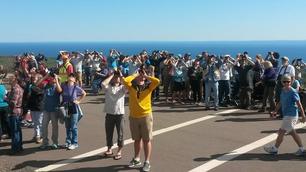
Come and celebrate the fall bird migration with us! Hawk Weekend is the
annual festival held by the Hawk Ridge Bird Observatory in Duluth, MN.
It is a wonderful opportunity to showcase one of North America’s best
places to experience the fall bird migration at Hawk Ridge Nature
Reserve. There will be a variety of field trips, hikes, programs, and
activities for all ages! Registration and more info on guest speaker coming soon!
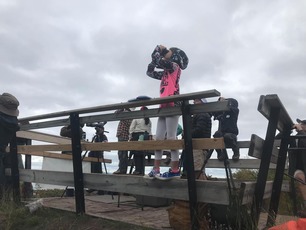 BECOME A MEMBER TODAY!
BECOME A MEMBER TODAY!
If
you're already a member of Hawk Ridge, we sincerely appreciate your
support! THANK YOU! If you aren't, we hope you've enjoyed your
experience with us and at Hawk Ridge and ask that you renew or join as a Hawk Ridge member today! Our memberships and donations help drive our bird conservation research and education programs. You can check out our exciting membership benefits and join or renew online HERE!
.jpg?0.7989867935476688) 2019 ANNUAL HIGHLIGHTS - Please click HERE to read and see how your support is helping us make a difference! Thank you!
2019 ANNUAL HIGHLIGHTS - Please click HERE to read and see how your support is helping us make a difference! Thank you!
RAISE $ FOR HAWK RIDGE BY WITH YOUR ONLINE SHOPPING!
Two simple ways to raise money for Hawk Ridge are by using 1) GoodShop and 2) Amazon Smile for your online shopping in support of Hawk Ridge Bird Observatory to receive proceeds.
Sincerely,
Janelle Long
Executive Director
Hawk Ridge Bird Observatory
Hawk Ridge Bird Observatory
P.O. Box 3006
Duluth, MN 55803-3006
Call: 218-428-6209
Contact: mail@hawkridge.org
Visit: www.hawkridge.org
